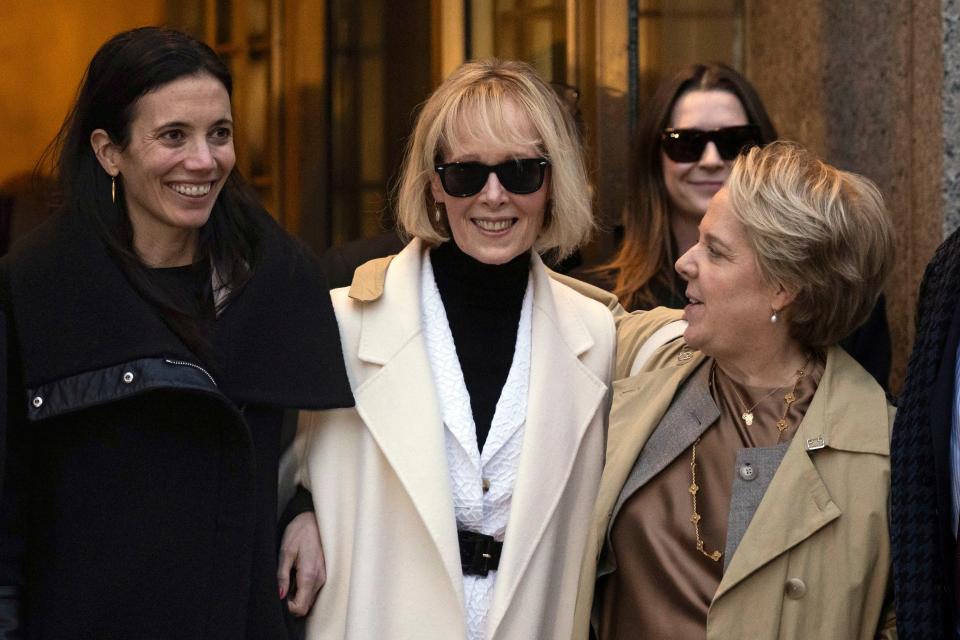Trump's sexual assault on E. Jean Carroll cost him just $2mil. His mouth put him on the hook for nearly $90mil more.
Most of the nearly $100 million Donald Trump owes E. Jean Carroll stems from verbal attacks on her.
Last year, a jury found that Trump sexually abused Carroll and she was awarded $2 million for it.
After two defamation trials, the former president is on the hook for almost $100 million more.
A Manhattan federal jury found last year that Donald Trump had sexually abused writer E. Jean Carroll in a New York City department store dressing room in the 1990s.
For the sexual assault, the jury ordered Trump to cough up just over $2 million to the longtime advice columnist.
But it wasn't a physical attack that put the former president on the hook for the remaining $86.3 million in damages in both of Carroll's high-profile civil defamation trials— it was his mouth.
"I think they said 'enough, enough.' Enough saying horrible, slimy, terrible things about me," Carroll told "CBS Mornings" of the second Manhattan federal jury, which read its verdict into the record Friday.
That jury ordered Trump to pay Carroll the bulk of his total legal debt to her, $83.3 million, after he spent years rattling off defamatory remarks and attacks against her.
This most recent trial differed from last year's, at which Carroll sued Trump for both the sexual abuse and defamation. Last year's jury found Trump liable for not only sexually assaulting her, but for defaming her by denying it in an October 2022 Truth Social post. He called Carroll's allegations a "hoax," a "lie" and ranted that she wasn't his "type."
The jury awarded Carroll $5 million in total damages in that trial. The largest portion of the awarded damages in that case was the $2 million for sexually abusing her in 1996, as well as another $20,000 in punitive damages.
For defamation, that jury also awarded Carroll $1 million in damages, $1.7 million to help repair the reputational harm caused by Trump, and $280,000 in punitive damages.
Compensatory damages are an amount that the jury finds equivalent to what the plaintiff suffered. Punitive damages are awarded to punish the defendant for behavior the jury found was negligent or intentional.
This recent trial, which wrapped up Friday, centered on defamation claims Carroll brought against Trump involving two statements he made in 2019, while he was president, disparaging Carroll by calling her a liar and insulting her appearance.
"I'll say it with great respect: Number one, she's not my type. Number two, it never happened. It never happened, OK?" Trump told The Hill, denying Carroll's claims.
Since Trump was already found liable for sexually abusing and defaming Carroll, jurors in the most recent trial only needed to determine any additional defamation damages.
The jury in that case returned the stunning verdict last week after less than three hours of deliberation, awarding Carroll a whopping $65 million in punitive damages and $18.3 million in compensatory damages.
Trump's refusal to cease his attacks on Carroll in the wake of the first jury's verdict is likely why a new jury came back with stiffer penalties, defamation experts told Business Insider.
Representatives for Trump did not immediately respond to a request for comment by Business Insider on Thursday afternoon.

Punitive damages made it a headline-grabbing number
The compensatory damages concerned Trump's false 2019 statements. Chris Mattei, a defamation attorney best known for winning a $1.5 billion jury verdict against conspiracy theorist Alex Jones, told Business Insider that jurors may have believed those statements caused more damage because Trump made them from the White House, where they were broadcast around the world.
"That afforded Donald Trump a different kind of platform from which he could direct his followers to harass and further defame Ms. Carroll," Mattei said.
The punitive damages — which comprised the lion's share of the jury award — allowed jurors to take into account subsequent remarks by Trump, who continued calling Carroll a liar even throughout the trial. That became a substantial focus of the January 2024 trial, where jurors saw numerous statements from Trump attacking Carroll, including a clip from a press conference held during the trial itself, where he called Carroll a liar.
Trump didn't attend a single day of the first trial. But in the second one, held in the same lower Manhattan federal courtroom, he was attentive and was in constant communication with his legal team (not always in a good way — Carroll's lawyers complained to the judge that the jury could hear his loud mutterings).
He testified on the stand, if only briefly. At times Trump acted out in court, and even as he and Carroll faced off in the courtroom, his Truth Social account blasted out more posts attacking her.

Defamation experts told Business Insider that the jurors in the latest trial were clearly sending a message by awarding such an eye-popping amount to Carroll. They had eyes on Trump this time, and they clearly didn't like what they saw.
"Donald Trump did not attend the first trial, as he did here, and did certain things that the jury was able to observe," Mattei said. "And that may have motivated them in a way that the first jury wasn't."
Carroll "did everything she was supposed to do in going through the course in the first case and getting her award," according to J. Erik Connolly, a defamation attorney at Benesch Law.
"And that should have brought her peace of mind, and it didn't, and this is perhaps the only way the jury says, well, the normal course didn't bring her the peace of mind and the deterrence that she was entitled to as a victim," Connolly said. "This, second time now, maybe this will."
Carroll's lawyers argued that Trump showed flagrant disrespect for the rule of law. First by ignoring the earlier verdict and continuing to defame Carroll — even bragging on CNN that his poll numbers went up. And, second, by disrespecting courtroom procedures while attending the second trial.
"At that point, you are compounding the wrongdoing or the misconduct that the jury would want to deter," Connolly said.
Only a massive punitive damages verdict, Carroll's lawyers argued, would get Trump to actually stop.
"While Donald Trump may not care about the law, while he certainly doesn't care about the truth, he does care about money," Carroll's attorney Roberta Kaplan told jurors in her closing argument. "As a result, your decision to award a large amount of punitive damages may be the only hope that E. Jean Carroll has to ever be free from Donald Trump's relentless attacks ever again."
That strategy appeared to work. While Trump vowed to appeal the $83.3 million jury decision, as he did with the first verdict, and has complained that the trial was unfair, he hasn't publicly called Carroll a liar since last week's verdict.
Read the original article on Business Insider


